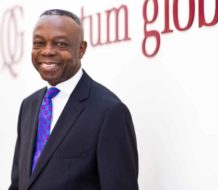Powering and industrializing the economy of Africa are among key priorities outlined in March by the new head of the African Development Bank.
Akinwumi Adesina, president of the bank since September, told about 500 business leaders from 43 countries at the fourth Africa CEO Forum in Abidjan that the continent will rely on private investment as it seeks to advance on “the value chain” from being a source of raw materials to becoming a manufacturing economy.
Adesina said the African Development Bank will focus on five key priorities as it seeks to improve the business climate and quality of life on the continent.
The priorities, which Adesina dubbed the “High 5’s,” are:
- Light up and power Africa
This priority is critical to the development of a manufacturing economy, the bank president said.
He noted that more than 645 million Africans do not electricity while energy bottlenecks power shortages cost Africa about two to four percent of gross national product each year, undermining economic growth and job creation.
He said the African Development Bank has launched a program New Deal on Energy for Africa that has investment commitments of $12 billion over the next five years, in addition to public and private partnerships worth about $50 billion.
- Feed Africa
With two-thirds of the world’s uncultivated arable land and more than 60 percent of its population involved in agriculture, Africa could become a powerhouse in providing food to the world, Adesina said.
Nevertheless, many on the continent suffer from malnutrition and African nations are forced to import food at a high cost, some $35 billion annually.
Adesina said African leaders must change their strategy from thinking about agriculture as a way of managing poverty to treating it like a business to generate wealth and diversify economies.
- Industrialize Africa
In sub-Saharan Africa, manufacturing accounts for only 11 percent of economic output on the continent and less than two percent of global output.
However, without infrastructure, power, and a supportive business environment, Africa will continue to import manufactured goods that might otherwise be made in Africa, Adesina said.
- Integrate Africa
Adesina said the fragmentation of African economies is holding back progress and integration will be critical to driving industrialization.
He called on African governments to implement regional and inter-regional agreements that would remove barriers to integration.
He said the African Development Bank would continue to invest in regional infrastructure and work with regional partners to facilitate integration of trade and transport.
- Improve the quality of life for Africans
Adesina said the bank will accelerate its investments in vocational training and education to help drive economic development.
The centerpiece of this effort is the “Jobs for Africa’s Youth Initiative,” a partnership of the development bank, the United Nations Economic Commission for Africa and the African Union.
Adesina said the goal of the initiative goal is to reach 50 million young people and create 25 million jobs in the coming decade, to enable young Africans to “realize their economic potential through business incubation and financing.”
Private sector critical to growth
He said the private sector, which accounts for 90 percent of African jobs, must play a major role in the youth education initiative and in the overall development of the economy.
The private sector, he said, accounts for 90 percent of employment on the continent, 80 percent of production and two-third of investments.
He said the bank’s effort to support private enterprise includes investment in private projects. In 2015, the development bank approved private sector projects at a cost of $2.4 million out of a total of $9 billion.
Adesina said the continent is poised for growth in spite of challenges to the global economy and, in Africa, declines in commodity prices and in demand from China.
He said economic growth on the continent will outpace global growth. The global economy is projected to grow by three percent in 2016 while the predicted growth rate for Africa is 4.4 percent this year and five percent in 2017, he said.



